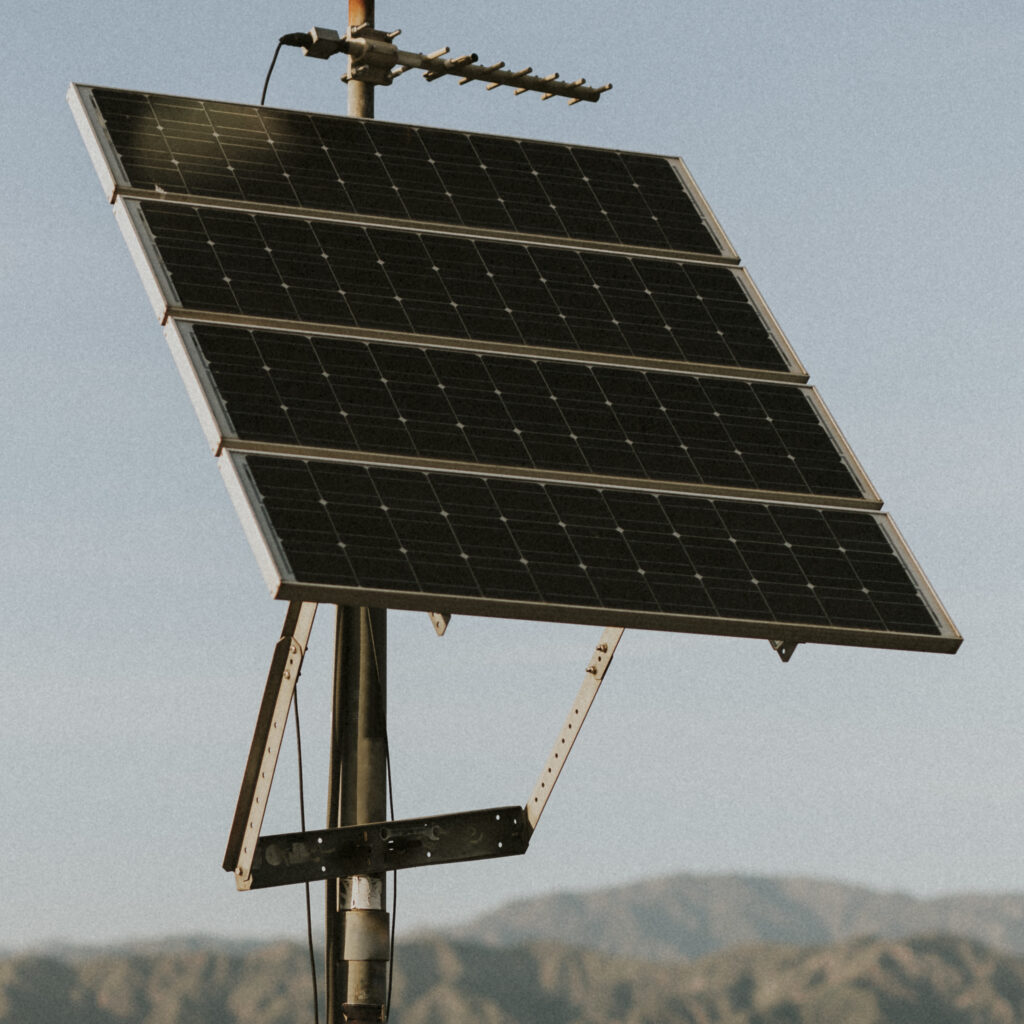Please accept the meeting invite in the email to ensure you don’t get rescheduled.
To get the most out of your solar call, be in a quiet place with a pen and paper.
It is also important that all homeowners are present because unexpected questions do come up once we get going.
We want to make sure everyone is as informed as possible.
Before the call we will examine the roof of your property via satellite imagery. Doing so will help us to understand its maximum capacity for the number of solar panels your roof can support.
Additionally we will study your utility bill to see what the optimal solar panel installation would comprise, including number of solar panels and the type of system that will work best for you.
During the call we will be able to answer any further questions you have and also test any assumptions we have made in our assessment.
Our goal is to conclude the call with enough understanding to be able to recommend a system that will pay for itself as quickly as possible and give you energy freedom for many decades to come.

Ask a question
Hi, welcome to Stanton Solar. What can we help you with today?

Most homes are set up to accommodate a system large enough to cover 100% of your bill. However if you have a higher than average power consumption, you may need to upgrade your electrical upgrade. If your annual consumption is higher than 16,000kWh’s per year, you may need a panel swap, a service upgrade or a duel lug meter base to allow for a larger than average sized system.
Week 1-2: Schedule and complete the Home Energy Audit and Enrollment Program.
Week 3-8: Submit GHL application and await approval while we obtain permits and approvals.
Week 9-10: Receive GHL approval and schedule installation dates.
Week 11-14: Complete installation phases and activate your solar system.
Week 15: Conduct out inspection with Sustainable Housing.
Week 16: Finalize loan details and make the final payment.
When you need to redo the roof, the process is much easier than the initial installation. We come take the system off, your roofers do their thing and then we put the system back up when they are done.
The approximate cost of this depends on the difficulty of the roof. A one story bungalow is much cheaper than a 3 story castle with 45 degree slopes.
People often think about the panels and inverters but forget to ask how the panels are attached to the roof. We use special equipment called RT Minis to attach the panels. They come with a 25-year leak-proof warranty, so you don’t have to worry about leaks. You can even watch a video where they install one underwater. https://www.youtube.com/watch?v=HtCDP5YBMQM They are rated for wind speeds of 180mph (289km/h).
Once permits and financing are approved, installation begins within a few weeks. Permit approval may take 4–6 weeks.

No. Snow does not significantly impact annual energy production, and panels are designed to withstand snow coverage.
Nothing.
Solar production from December through February is next to nothing. March through November are your production months. Winter production is a small fraction of your annual production, and the week or 2 of snow on the panels amounts to a tiny fraction of the already small fraction. It is not worth breaking your neck trying to clear it or spending money to try to remove it.
Just relax and wait for the spring.
YES – even though Nova Scotia can sometimes be cloudy, solar power is still a great solution! Solar PV (PhotoVoltaics) will work all winter long. However, December, January, and February produce very little. March is the first month of sound energy output. On an annual basis, the energy you create and bank through March to November carries those winter months.
While the panels are under performance warranty for 25-30 years, the panels can live 50+ years. They will continue to produce power, the manufacturers just don’t guarantee performance on the age after the warranty expires.
People install rodent guards and bird cages on solar panels for two reasons. First, to follow electrical rules that keep critters away from the wires. Second, to stop birds, especially pigeons, from nesting under the panels. There are two ways to attach the bird cages. One way is to wrap the fencing around the edges of the panels, but this can cause damage from ice and snow over time. The other way is to attach the fencing underneath the panels, which protects it from ice and snow and meets the electrical rules. However, pigeons might still try to nest at the ends of the panels.
500W Thornova Solar Panels:
Workmanship and production warranty: 25 years.
Efficiency guaranteed at 84% after 25 years.
Lifespan: 30–50 years.
Anchor Points:
Leak-proof warranty: 25 years.
Lifespan: 25–40 years.
Racking Systems:
Warranty: 20 years.
Lifespan: 20–35 years.
Inverters:
Manufacturer defect warranty: 10 years (optional extension to 20 years).
Lifespan: 12–18 years.
Workmanship Warranty: 6 years.

As a general rule of thumb solar will save you 3 X your solar investment over 25 years or 6 times as much over 35.
In Canada:
0% financing for 10 years (up to $40,000).
Rebates: $3,000 in Nova Scotia and $10,000 in British Columbia.
PACE programs in Nova Scotia allow payment through property taxes.
Savings from any solar system depends on many factors; each home is unique. Systems are limited by energy consumption, roof space, electrical service size, etc.
Estimating savings from a solar energy system is a complex process that involves detailed analysis and modelling. At Stanton Solar, we leverage advanced tools like Aurora Solar to create precise models of your potential solar installation. Here’s an in-depth look at how we estimate your savings:
System Modelling with Aurora Solar
Aurora Solar is a cutting-edge software platform that allows us to design and simulate solar photovoltaic (PV) systems with high accuracy. Here’s how we use it:
Accurate Site Modeling: We input your property’s address into Aurora, which utilizes high-resolution satellite imagery and LiDAR data to create a 3D model of your roof and surrounding environment. This helps us determine the optimal placement of solar panels by considering roof angles, azimuth, and potential shading obstacles.
Shading Analysis: Aurora performs detailed shading analyses by simulating the sun’s path throughout the year. It identifies any obstructions like trees, chimneys, or nearby buildings that might cast shadows on your panels, affecting their performance.
Performance Simulations: The software simulates how your solar system will perform over time, taking into account panel specifications, inverter efficiency, and degradation rates. It helps us predict the energy production on an hourly, daily, and annual basis.
Utilization of Local and Historical Data
Meteorological Data: Aurora incorporates local weather data, including historical sunlight availability, temperature, and weather patterns. This information is crucial for accurate energy production estimates.
Electrical Consumption Patterns: We analyze your past electricity bills to understand your energy usage patterns. This helps us size the solar system appropriately to meet your specific needs.
Utility Rates and Policies: The software includes up-to-date information on local utility rates, time-of-use pricing, and net metering policies. This ensures that our financial models reflect your actual savings accurately.
Yes, there are! There are rebates and incentives available from both the federal and provincial governments. We do as much of the application process as we are allowed and we walk you through anything that you have to do. We make it all very easy.
In addition to various provincial programs, There are there is the “Investment Tax Credit for Renewable Energy,” a program available to businesses.
There are many factors that play into the cost of a solar system. Almost every system unique. The largest determining factor is the size of the system. The bigger the system, the bigger the cost. After that there are variables such as your current electrical service size, roof steepness, number of array needed or the profile of a metal roof.
Each system size is customizable and can be scaled up or down to fit within a budget.
For a personalized estimate, it’s recommended to consult with us, as we can assess your specific situation.
That’s a great question, though the answer involves some variables.
The time it takes for your system to pay for itself depends on factors like inflation and the rate at which electricity prices increase. Between 2002 and 2024, electricity rates in Nova Scotia rose by an average of 4.07% per year, so our payback estimates are based on a 4% annual escalation rate. Given this rate, typical payback periods range between 9 to 12 years.
However, energy costs can vary significantly. For example, Nova Scotia Power almost implemented a 20% rate increase in 2025 (link to article: Federal Loan Shields NSP Customers from Rate Hike). If such a hike had occurred, the payback period for your system would likely be much shorter. It’s also important to consider carbon taxes, which were largely absent between 2002 and 2024. Going forward, these costs could increase and impact electricity rates, potentially accelerating the payback timeline.
In Canada:
0% financing for 10 years (up to $40,000).
Rebates: $3,000 in Nova Scotia and $10,000 in British Columbia.
PACE programs in Nova Scotia allow payment through property taxes.

Our solar system comprises several essential components working together seamlessly to harness and convert solar energy.
The primary components include solar panels, which capture sunlight and convert it into electricity through photovoltaic cells. An inverter transforms the generated direct current (DC) into usable alternating current (AC) for your home. Racking and mounting structures ensure the secure installation of solar panels on your roof or property.
Additionally, monitoring systems allow you to track your energy production and efficiency. Our comprehensive solar systems are designed for reliability, efficiency, and long-term sustainability, providing a robust and environmentally friendly energy solution.
Stanton solar panels harness energy from the sun through photovoltaic (PV) cells. These cells, typically made of semiconductor materials, convert sunlight into electricity. When sunlight strikes the PV cells, it creates an electric field, allowing the movement of electrons and generating direct current (DC) electricity.
Our solar panels are designed to capture sunlight efficiently, even in low-light conditions. The generated DC electricity is then converted into alternating current (AC) by an inverter, making it compatible with your home’s electrical system. This clean and renewable energy can power your household or business, reduce reliance on the grid, and contribute to a more sustainable future. If you have more questions or need detailed information, don’t hesitate to contact us.
The short answer is No
Here’s a detailed explanation of monitoring:
Difference Between Tigo and Solis Cloud Apps:
The Tigo app monitors power output from the optimizers located under each solar panel. The Solis app, on the other hand, monitors power output from the inverter itself. While both apps provide valuable information, neither can show the energy consumption of your home or how much energy is sent to the grid. They only display the amount of electricity produced by your solar system.
Tracking Energy Sent to the Grid vs. Energy Consumed:
To monitor the balance between energy produced and energy consumed by your home, you would need an energy monitor installed at the electrical panel level. A device such as a Sense monitor would be required. These devices can give you real-time data on household energy usage and production, helping you see the exact amount of energy being sent to the grid.
For further details, you may refer to online resources. Here is a video that provides a brief overview of how these energy monitors work: https://www.youtube.com/watch?v=JZ_j5b9_8pY.
Imagine we’re using a 10kW inverter for this example.
If you have exactly 10kW worth of solar panels hooked up to that 10kW inverter, you might think, “Great! Perfect match, right?” Well, not quite, because your solar panels often don’t produce their full rated power. They’re tested under ideal lab conditions that don’t always match real life. Outside, real-world conditions like the angle of the sun, cloud cover, and temperature all affect the power output, meaning your panels might only hit 100% of their rated capacity for short periods, like on the sunniest, clearest days around noon.
Now, if we leave the system as-is, our 10kW inverter won’t be running at its full capacity most of the time, since the panels are often producing less than their maximum output. This is where the concept of “oversizing” comes in. By adding more than 10kW of panels—let’s say 12kW, for example—we give the system a better chance to keep the inverter working closer to its 100% capacity throughout the day. Even if the panels aren’t producing at full capacity, there’s enough total power coming in to keep the inverter closer to its max output more of the time. This setup allows you to get more energy out of the system over the course of the year.
Of course, on those rare days when the sun is perfect, and all the panels are hitting their full power, the inverter can’t handle more than 10kW, so it “clips” the extra power it can’t use. But this only happens occasionally and for short periods, and it’s a worthwhile trade-off for the boost in efficiency you get the rest of the time. Finally, there’s a science to oversizing—it depends on things like the tilt of your roof, the direction it faces, and the average weather. All of these factors help us figure out the ideal amount of oversizing to keep the inverter running efficiently and make the most of your solar power.
Choosing between micro inverters and string inverters depends on the best design for your solar system. Electronics and heat don’t mix well, so it’s better to have as few electronics on the roof as possible. If your roof has no shading issues, a string system is best because it has fewer parts and is easier to maintain.
A string system works like a single-lane highway, where the slowest car sets the speed for everyone. If one panel gets less sunlight, it slows down the others. If you have shading, adding optimizers is like adding a passing lane so the other panels can keep working well.
Optimizers are simple electronics, but they have limits. If your roof has many small panels facing different directions, micro inverters are better. Micro inverters are more complex and sensitive but handle different panel setups better, even though they can get very hot on the roof.

Understanding the differences between Net Metering, grid-tie and hybrid solar systems can help you choose the best option for your needs
Credit Structure: With net metering, you receive credits on your electricity bill for the excess electricity your solar panels with the account reconciling once per year.
No Battery Storage Needed: They don’t require batteries because any excess energy is credited to your account, effectively storing it in the grid for later use.
Connected to the Utility Grid: Net metering systems are connected through your electrical panel to your local utility grid, allowing for seamless energy exchange.
Grid-Tie Solar Systems
Connected to the Utility Grid: Grid-tie systems are linked directly to your local utility grid.
No Battery Storage Needed: They don’t require batteries because any excess energy your panels produce is sent back to the grid.
Net Metering Benefits: You can receive credits on your electricity bill for the surplus energy you supply.
Lower Initial Cost: Without the need for batteries, these systems are generally less expensive to install.
Ideal For: Homes in areas with reliable grid electricity that want to reduce their energy bills.
Off-Grid Solar Systems
Completely Independent: Off-grid systems are not connected to the utility grid at all.
Requires Battery Storage: They rely on batteries to store energy for use when the sun isn’t shining.
Self-Sufficiency: You’ll generate and use your own power exclusively.
Higher Initial Cost: The addition of batteries and other equipment increases the upfront investment.
Ideal For: Remote locations without grid access or those seeking complete energy independence.
Hybrid Solar Systems
Combination of Both: Hybrid systems are connected to the grid and also have battery storage.
Flexible Energy Use: You can store excess energy for use during outages or peak demand times.
Energy Management: Allows for greater control over your energy consumption and costs.
Moderate Initial Cost: More expensive than grid-tie but can offer savings in the long run.
Ideal For: Homes wanting the reliability of the grid with the backup and savings benefits of battery storage.
Many folks who initially thought solar wouldn’t work for them are pleasantly surprised by the results. With our no-pressure approach, it never hurts to find out what’s possible. You’ll never have to deal with pushy salespeople. We listen to what you need and then show you what your options are. We’ll tell you how the entire process works and you let us when you’re ready to move forward.
No, your solar system won’t work during a power outage because it could be dangerous for workers fixing the grid. However, you can get a hybrid inverter with batteries, and that would give you power during an outage.
You can’t disconnect from the grid. It isn’t allowed. In all honesty, you likely wouldn’t want to anyway. The net metering program is awesome and allows you to enjoy the benefits of solar without expensive batteries, lifestyle changes and constant monitoring. Net Zero is when you are connected to the grid but you produce enough electricity with your solar system that you only pay base charges.
While it is true that there is an optimal positioning for a solar panel, it isn’t necessary for it to be perfect. You can see on this chart that east and west can be great, even north facing if it’s on a low enough angled slope. East west can actually help you catch the full day of sun as moves across the sky.
Refer to this image which shows the efficiency of various angles – https://stantonsolar.com/wp-content/uploads/2Efficiency-Chart_page-0001-1.jpg

Yes absolutely. We have an amazing reputation for taking care of people. We’re always a call or email away. We value your experience with us and strive to ensure you have the support you need at every step.
It depends on the issue. If it is workmanship issue, then you give us a call. If it’s a system alarm/issue, you call the manufacturer support. They can see your system remotely, can identify/fix most issues but if they need a technician on site, they’ll let you know to call us. You give us the ticket number and we go from there.
In most cases someone is out within a week or 2 to get it producing power again.

You get paid 1:1 whenever you are putting power onto the grid. So during the day when rates are high, you will receive credits at that rate. But on the weekends it’s off peak.
An important thing to note is that we are unable to predict individual consumption patterns for customers with TOU. Savings can vary to a degree depending on when power is consumed from the grid. TOU could work out advantageously or could be a disadvantage depending on the person. However we have always heard good reports back.
Stanton can only ensure that a solar system produces the yearly estimated production.
The government sets a price per ton of carbon dioxide (CO₂) emitted. This price is added to the cost of fossil fuels based on their carbon content.
Implementation:
The tax can be applied at various points in the supply chain, such as production, distribution, or consumption. Companies burning fossil fuels pay the tax, which may be passed on to consumers through higher prices.
Net metering is like a special deal with the power company. When your panels make extra electricity, you send it to the power company, and they give you a “credit” like a gift card. Later, when the sun isn’t shining and you need more electricity than your panels can make, you can use those credits to “buy” electricity from the power company without paying extra.
So, it’s kind of like a trade—your extra sunshine power for some extra power from the grid when you need it. You help the power company, and they help you!
No. Nova Scotia Power tried to introduce tariffs over a year ago. It was rejected and the government quickly put legislation in place to legally protect systems under 27kW from any future changes.
https://nslegislature.ca/sites/default/files/legc/statutes/electricity.pdf
https://novascotia.ca/just/regulations/regs/elecrenew.htm
Credits roll over month to month and if you are in surplus at the end of the year then it gets credited to your account in dollar form.

When choosing a solar company, it’s important to pay attention to a few key things. First, check the company’s ratings, reviews, and whether they are accredited with the Better Business Bureau, as these can give you an idea of their reputation. Also, make sure to ask how the solar panels will be attached to your roof, including the techniques and anchors used, and whether there is a warranty for this. Lastly, be cautious of offers that seem too good to be true or are very different from what other companies provide, especially when it comes to warranties or financing options.
Any electrical system could be a fire hazard, but string inverters have safety features like alarms and quick shut-down systems to prevent fires. All solar parts must be approved by the Canadian Safety Association (CSA) to pass inspection. Nowadays, string inverters are very sensitive and might even give warnings when there isn’t really a problem. Fire safety is very important, and CSA takes it seriously.

Stanton Solar is a family-owned business that started in 2018. They have a 5-star rating and an A+ rating from the Better Business Bureau. They offer a 25-year leak-proof warranty on the roof anchors. They also help you with programs and support. Stanton Solar supports local sports and athletes and is a Gold Sponsor of the Nature Conservancy of Canada.
The production numbers from solar companies are usually very accurate because almost all companies use the same simulation software to predict how much electricity your system will make. For example, if two reports show that your system will produce 10,000 kWh per year, the numbers are likely correct. The reason the savings, return on investment (ROI), and other numbers might be different is because of different assumptions about how much your future bills will go up. No company can make a kilowatt-hour (kWh) worth more than another.
To make sure the numbers are correct, check the company’s reviews and profile on the Better Business Bureau. If they’ve been in business for more than 3 years and their systems weren’t producing what they promised, you would likely see bad reviews from unhappy customers.
Family-owned, A+ BBB rating, local support, and a strong community presence.
When looking at solar proposals, it’s important to pay attention to assumptions. Different companies use different ideas, like how much your electricity bill will go up over time. If they assume a high increase, your savings might look better than they really are. Check what assumptions they are using.
Also, some companies show prices before taxes and rebates, while others show prices after rebates but before taxes. Make sure you know what they are showing.
The production numbers, like how much electricity your system will make, are usually accurate because most companies use the same software. If two reports show the same electricity production but different savings, it’s probably because of different assumptions about your future bills. No company can make a kilowatt-hour (kWh) worth more than another.

Most homes are set up to accommodate a system large enough to cover 100% of your bill. However if you have a higher than average power consumption, you may need to upgrade your electrical upgrade. If your annual consumption is higher than 16,000kWh’s per year, you may need a panel swap, a service upgrade or a duel lug meter base to allow for a larger than average sized system.
Week 1-2: Schedule and complete the Home Energy Audit and Enrollment Program.
Week 3-8: Submit GHL application and await approval while we obtain permits and approvals.
Week 9-10: Receive GHL approval and schedule installation dates.
Week 11-14: Complete installation phases and activate your solar system.
Week 15: Conduct out inspection with Sustainable Housing.
Week 16: Finalize loan details and make the final payment.
When you need to redo the roof, the process is much easier than the initial installation. We come take the system off, your roofers do their thing and then we put the system back up when they are done.
The approximate cost of this depends on the difficulty of the roof. A one story bungalow is much cheaper than a 3 story castle with 45 degree slopes.
People often think about the panels and inverters but forget to ask how the panels are attached to the roof. We use special equipment called RT Minis to attach the panels. They come with a 25-year leak-proof warranty, so you don’t have to worry about leaks. You can even watch a video where they install one underwater. https://www.youtube.com/watch?v=HtCDP5YBMQM They are rated for wind speeds of 180mph (289km/h).
Once permits and financing are approved, installation begins within a few weeks. Permit approval may take 4–6 weeks.

No. Snow does not significantly impact annual energy production, and panels are designed to withstand snow coverage.
Nothing.
Solar production from December through February is next to nothing. March through November are your production months. Winter production is a small fraction of your annual production, and the week or 2 of snow on the panels amounts to a tiny fraction of the already small fraction. It is not worth breaking your neck trying to clear it or spending money to try to remove it.
Just relax and wait for the spring.
YES – even though Nova Scotia can sometimes be cloudy, solar power is still a great solution! Solar PV (PhotoVoltaics) will work all winter long. However, December, January, and February produce very little. March is the first month of sound energy output. On an annual basis, the energy you create and bank through March to November carries those winter months.
While the panels are under performance warranty for 25-30 years, the panels can live 50+ years. They will continue to produce power, the manufacturers just don’t guarantee performance on the age after the warranty expires.
People install rodent guards and bird cages on solar panels for two reasons. First, to follow electrical rules that keep critters away from the wires. Second, to stop birds, especially pigeons, from nesting under the panels. There are two ways to attach the bird cages. One way is to wrap the fencing around the edges of the panels, but this can cause damage from ice and snow over time. The other way is to attach the fencing underneath the panels, which protects it from ice and snow and meets the electrical rules. However, pigeons might still try to nest at the ends of the panels.
500W Thornova Solar Panels:
Workmanship and production warranty: 25 years.
Efficiency guaranteed at 84% after 25 years.
Lifespan: 30–50 years.
Anchor Points:
Leak-proof warranty: 25 years.
Lifespan: 25–40 years.
Racking Systems:
Warranty: 20 years.
Lifespan: 20–35 years.
Inverters:
Manufacturer defect warranty: 10 years (optional extension to 20 years).
Lifespan: 12–18 years.
Workmanship Warranty: 6 years.

As a general rule of thumb solar will save you 3 X your solar investment over 25 years or 6 times as much over 35.
In Canada:
0% financing for 10 years (up to $40,000).
Rebates: $3,000 in Nova Scotia and $10,000 in British Columbia.
PACE programs in Nova Scotia allow payment through property taxes.
Savings from any solar system depends on many factors; each home is unique. Systems are limited by energy consumption, roof space, electrical service size, etc.
Estimating savings from a solar energy system is a complex process that involves detailed analysis and modelling. At Stanton Solar, we leverage advanced tools like Aurora Solar to create precise models of your potential solar installation. Here’s an in-depth look at how we estimate your savings:
System Modelling with Aurora Solar
Aurora Solar is a cutting-edge software platform that allows us to design and simulate solar photovoltaic (PV) systems with high accuracy. Here’s how we use it:
Accurate Site Modeling: We input your property’s address into Aurora, which utilizes high-resolution satellite imagery and LiDAR data to create a 3D model of your roof and surrounding environment. This helps us determine the optimal placement of solar panels by considering roof angles, azimuth, and potential shading obstacles.
Shading Analysis: Aurora performs detailed shading analyses by simulating the sun’s path throughout the year. It identifies any obstructions like trees, chimneys, or nearby buildings that might cast shadows on your panels, affecting their performance.
Performance Simulations: The software simulates how your solar system will perform over time, taking into account panel specifications, inverter efficiency, and degradation rates. It helps us predict the energy production on an hourly, daily, and annual basis.
Utilization of Local and Historical Data
Meteorological Data: Aurora incorporates local weather data, including historical sunlight availability, temperature, and weather patterns. This information is crucial for accurate energy production estimates.
Electrical Consumption Patterns: We analyze your past electricity bills to understand your energy usage patterns. This helps us size the solar system appropriately to meet your specific needs.
Utility Rates and Policies: The software includes up-to-date information on local utility rates, time-of-use pricing, and net metering policies. This ensures that our financial models reflect your actual savings accurately.
Yes, there are! There are rebates and incentives available from both the federal and provincial governments. We do as much of the application process as we are allowed and we walk you through anything that you have to do. We make it all very easy.
In addition to various provincial programs, There are there is the “Investment Tax Credit for Renewable Energy,” a program available to businesses.
There are many factors that play into the cost of a solar system. Almost every system unique. The largest determining factor is the size of the system. The bigger the system, the bigger the cost. After that there are variables such as your current electrical service size, roof steepness, number of array needed or the profile of a metal roof.
Each system size is customizable and can be scaled up or down to fit within a budget.
For a personalized estimate, it’s recommended to consult with us, as we can assess your specific situation.
That’s a great question, though the answer involves some variables.
The time it takes for your system to pay for itself depends on factors like inflation and the rate at which electricity prices increase. Between 2002 and 2024, electricity rates in Nova Scotia rose by an average of 4.07% per year, so our payback estimates are based on a 4% annual escalation rate. Given this rate, typical payback periods range between 9 to 12 years.
However, energy costs can vary significantly. For example, Nova Scotia Power almost implemented a 20% rate increase in 2025 (link to article: Federal Loan Shields NSP Customers from Rate Hike). If such a hike had occurred, the payback period for your system would likely be much shorter. It’s also important to consider carbon taxes, which were largely absent between 2002 and 2024. Going forward, these costs could increase and impact electricity rates, potentially accelerating the payback timeline.
In Canada:
0% financing for 10 years (up to $40,000).
Rebates: $3,000 in Nova Scotia and $10,000 in British Columbia.
PACE programs in Nova Scotia allow payment through property taxes.

Our solar system comprises several essential components working together seamlessly to harness and convert solar energy.
The primary components include solar panels, which capture sunlight and convert it into electricity through photovoltaic cells. An inverter transforms the generated direct current (DC) into usable alternating current (AC) for your home. Racking and mounting structures ensure the secure installation of solar panels on your roof or property.
Additionally, monitoring systems allow you to track your energy production and efficiency. Our comprehensive solar systems are designed for reliability, efficiency, and long-term sustainability, providing a robust and environmentally friendly energy solution.
Stanton solar panels harness energy from the sun through photovoltaic (PV) cells. These cells, typically made of semiconductor materials, convert sunlight into electricity. When sunlight strikes the PV cells, it creates an electric field, allowing the movement of electrons and generating direct current (DC) electricity.
Our solar panels are designed to capture sunlight efficiently, even in low-light conditions. The generated DC electricity is then converted into alternating current (AC) by an inverter, making it compatible with your home’s electrical system. This clean and renewable energy can power your household or business, reduce reliance on the grid, and contribute to a more sustainable future. If you have more questions or need detailed information, don’t hesitate to contact us.
The short answer is No
Here’s a detailed explanation of monitoring:
Difference Between Tigo and Solis Cloud Apps:
The Tigo app monitors power output from the optimizers located under each solar panel. The Solis app, on the other hand, monitors power output from the inverter itself. While both apps provide valuable information, neither can show the energy consumption of your home or how much energy is sent to the grid. They only display the amount of electricity produced by your solar system.
Tracking Energy Sent to the Grid vs. Energy Consumed:
To monitor the balance between energy produced and energy consumed by your home, you would need an energy monitor installed at the electrical panel level. A device such as a Sense monitor would be required. These devices can give you real-time data on household energy usage and production, helping you see the exact amount of energy being sent to the grid.
For further details, you may refer to online resources. Here is a video that provides a brief overview of how these energy monitors work: https://www.youtube.com/watch?v=JZ_j5b9_8pY.
Imagine we’re using a 10kW inverter for this example.
If you have exactly 10kW worth of solar panels hooked up to that 10kW inverter, you might think, “Great! Perfect match, right?” Well, not quite, because your solar panels often don’t produce their full rated power. They’re tested under ideal lab conditions that don’t always match real life. Outside, real-world conditions like the angle of the sun, cloud cover, and temperature all affect the power output, meaning your panels might only hit 100% of their rated capacity for short periods, like on the sunniest, clearest days around noon.
Now, if we leave the system as-is, our 10kW inverter won’t be running at its full capacity most of the time, since the panels are often producing less than their maximum output. This is where the concept of “oversizing” comes in. By adding more than 10kW of panels—let’s say 12kW, for example—we give the system a better chance to keep the inverter working closer to its 100% capacity throughout the day. Even if the panels aren’t producing at full capacity, there’s enough total power coming in to keep the inverter closer to its max output more of the time. This setup allows you to get more energy out of the system over the course of the year.
Of course, on those rare days when the sun is perfect, and all the panels are hitting their full power, the inverter can’t handle more than 10kW, so it “clips” the extra power it can’t use. But this only happens occasionally and for short periods, and it’s a worthwhile trade-off for the boost in efficiency you get the rest of the time. Finally, there’s a science to oversizing—it depends on things like the tilt of your roof, the direction it faces, and the average weather. All of these factors help us figure out the ideal amount of oversizing to keep the inverter running efficiently and make the most of your solar power.
Choosing between micro inverters and string inverters depends on the best design for your solar system. Electronics and heat don’t mix well, so it’s better to have as few electronics on the roof as possible. If your roof has no shading issues, a string system is best because it has fewer parts and is easier to maintain.
A string system works like a single-lane highway, where the slowest car sets the speed for everyone. If one panel gets less sunlight, it slows down the others. If you have shading, adding optimizers is like adding a passing lane so the other panels can keep working well.
Optimizers are simple electronics, but they have limits. If your roof has many small panels facing different directions, micro inverters are better. Micro inverters are more complex and sensitive but handle different panel setups better, even though they can get very hot on the roof.

Understanding the differences between Net Metering, grid-tie and hybrid solar systems can help you choose the best option for your needs
Credit Structure: With net metering, you receive credits on your electricity bill for the excess electricity your solar panels with the account reconciling once per year.
No Battery Storage Needed: They don’t require batteries because any excess energy is credited to your account, effectively storing it in the grid for later use.
Connected to the Utility Grid: Net metering systems are connected through your electrical panel to your local utility grid, allowing for seamless energy exchange.
Grid-Tie Solar Systems
Connected to the Utility Grid: Grid-tie systems are linked directly to your local utility grid.
No Battery Storage Needed: They don’t require batteries because any excess energy your panels produce is sent back to the grid.
Net Metering Benefits: You can receive credits on your electricity bill for the surplus energy you supply.
Lower Initial Cost: Without the need for batteries, these systems are generally less expensive to install.
Ideal For: Homes in areas with reliable grid electricity that want to reduce their energy bills.
Off-Grid Solar Systems
Completely Independent: Off-grid systems are not connected to the utility grid at all.
Requires Battery Storage: They rely on batteries to store energy for use when the sun isn’t shining.
Self-Sufficiency: You’ll generate and use your own power exclusively.
Higher Initial Cost: The addition of batteries and other equipment increases the upfront investment.
Ideal For: Remote locations without grid access or those seeking complete energy independence.
Hybrid Solar Systems
Combination of Both: Hybrid systems are connected to the grid and also have battery storage.
Flexible Energy Use: You can store excess energy for use during outages or peak demand times.
Energy Management: Allows for greater control over your energy consumption and costs.
Moderate Initial Cost: More expensive than grid-tie but can offer savings in the long run.
Ideal For: Homes wanting the reliability of the grid with the backup and savings benefits of battery storage.
Many folks who initially thought solar wouldn’t work for them are pleasantly surprised by the results. With our no-pressure approach, it never hurts to find out what’s possible. You’ll never have to deal with pushy salespeople. We listen to what you need and then show you what your options are. We’ll tell you how the entire process works and you let us when you’re ready to move forward.
No, your solar system won’t work during a power outage because it could be dangerous for workers fixing the grid. However, you can get a hybrid inverter with batteries, and that would give you power during an outage.
You can’t disconnect from the grid. It isn’t allowed. In all honesty, you likely wouldn’t want to anyway. The net metering program is awesome and allows you to enjoy the benefits of solar without expensive batteries, lifestyle changes and constant monitoring. Net Zero is when you are connected to the grid but you produce enough electricity with your solar system that you only pay base charges.
While it is true that there is an optimal positioning for a solar panel, it isn’t necessary for it to be perfect. You can see on this chart that east and west can be great, even north facing if it’s on a low enough angled slope. East west can actually help you catch the full day of sun as moves across the sky.
Refer to this image which shows the efficiency of various angles – https://stantonsolar.com/wp-content/uploads/2Efficiency-Chart_page-0001-1.jpg

Yes absolutely. We have an amazing reputation for taking care of people. We’re always a call or email away. We value your experience with us and strive to ensure you have the support you need at every step.
It depends on the issue. If it is workmanship issue, then you give us a call. If it’s a system alarm/issue, you call the manufacturer support. They can see your system remotely, can identify/fix most issues but if they need a technician on site, they’ll let you know to call us. You give us the ticket number and we go from there.
In most cases someone is out within a week or 2 to get it producing power again.

You get paid 1:1 whenever you are putting power onto the grid. So during the day when rates are high, you will receive credits at that rate. But on the weekends it’s off peak.
An important thing to note is that we are unable to predict individual consumption patterns for customers with TOU. Savings can vary to a degree depending on when power is consumed from the grid. TOU could work out advantageously or could be a disadvantage depending on the person. However we have always heard good reports back.
Stanton can only ensure that a solar system produces the yearly estimated production.
The government sets a price per ton of carbon dioxide (CO₂) emitted. This price is added to the cost of fossil fuels based on their carbon content.
Implementation:
The tax can be applied at various points in the supply chain, such as production, distribution, or consumption. Companies burning fossil fuels pay the tax, which may be passed on to consumers through higher prices.
Net metering is like a special deal with the power company. When your panels make extra electricity, you send it to the power company, and they give you a “credit” like a gift card. Later, when the sun isn’t shining and you need more electricity than your panels can make, you can use those credits to “buy” electricity from the power company without paying extra.
So, it’s kind of like a trade—your extra sunshine power for some extra power from the grid when you need it. You help the power company, and they help you!
No. Nova Scotia Power tried to introduce tariffs over a year ago. It was rejected and the government quickly put legislation in place to legally protect systems under 27kW from any future changes.
https://nslegislature.ca/sites/default/files/legc/statutes/electricity.pdf
https://novascotia.ca/just/regulations/regs/elecrenew.htm
Credits roll over month to month and if you are in surplus at the end of the year then it gets credited to your account in dollar form.

When choosing a solar company, it’s important to pay attention to a few key things. First, check the company’s ratings, reviews, and whether they are accredited with the Better Business Bureau, as these can give you an idea of their reputation. Also, make sure to ask how the solar panels will be attached to your roof, including the techniques and anchors used, and whether there is a warranty for this. Lastly, be cautious of offers that seem too good to be true or are very different from what other companies provide, especially when it comes to warranties or financing options.
Any electrical system could be a fire hazard, but string inverters have safety features like alarms and quick shut-down systems to prevent fires. All solar parts must be approved by the Canadian Safety Association (CSA) to pass inspection. Nowadays, string inverters are very sensitive and might even give warnings when there isn’t really a problem. Fire safety is very important, and CSA takes it seriously.

Stanton Solar is a family-owned business that started in 2018. They have a 5-star rating and an A+ rating from the Better Business Bureau. They offer a 25-year leak-proof warranty on the roof anchors. They also help you with programs and support. Stanton Solar supports local sports and athletes and is a Gold Sponsor of the Nature Conservancy of Canada.
The production numbers from solar companies are usually very accurate because almost all companies use the same simulation software to predict how much electricity your system will make. For example, if two reports show that your system will produce 10,000 kWh per year, the numbers are likely correct. The reason the savings, return on investment (ROI), and other numbers might be different is because of different assumptions about how much your future bills will go up. No company can make a kilowatt-hour (kWh) worth more than another.
To make sure the numbers are correct, check the company’s reviews and profile on the Better Business Bureau. If they’ve been in business for more than 3 years and their systems weren’t producing what they promised, you would likely see bad reviews from unhappy customers.
Family-owned, A+ BBB rating, local support, and a strong community presence.
When looking at solar proposals, it’s important to pay attention to assumptions. Different companies use different ideas, like how much your electricity bill will go up over time. If they assume a high increase, your savings might look better than they really are. Check what assumptions they are using.
Also, some companies show prices before taxes and rebates, while others show prices after rebates but before taxes. Make sure you know what they are showing.
The production numbers, like how much electricity your system will make, are usually accurate because most companies use the same software. If two reports show the same electricity production but different savings, it’s probably because of different assumptions about your future bills. No company can make a kilowatt-hour (kWh) worth more than another.